Jobs Support Scheme: Conor Murphy seeks clarity from Treasury
- Published
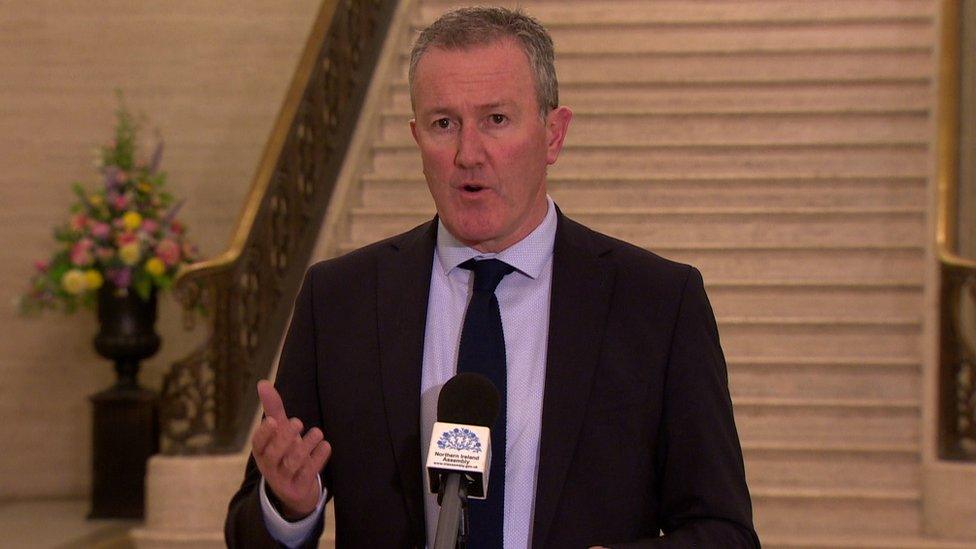
Conor Murphy said he would seek clarity from the chief secretary to the Treasury
Stormont's finance minister has said he is seeking "clarity" from the Treasury on a new job support scheme that will replace existing furlough arrangements.
Conor Murphy welcomed the fact there was now a plan to support workers when furlough ends on 31 October but said he still had "concerns" about it.
The UK-wide jobs support scheme was announced by Chancellor Rishi Sunak.
His new plan to stop mass job cuts will see many workers get at least 77% of their normal salaries for six months.
Under the scheme, which begins on 1 November, the government will subsidise the pay of employees who are working fewer than normal hours due to lower demand in their industry.
Mr Sunak said it would give businesses "the option of keeping employees in a job on shorter hours, rather than making them redundant".
Economy Minister Diane Dodds welcomed some of the initiatives, like the VAT rate being kept the same and also an extension to repayment times for government loans to businesses.
However, she said there was still greater scrutiny needed for some other aspects of the chancellor's announcement and that support for those who are self-employed fell short of what she had called for.
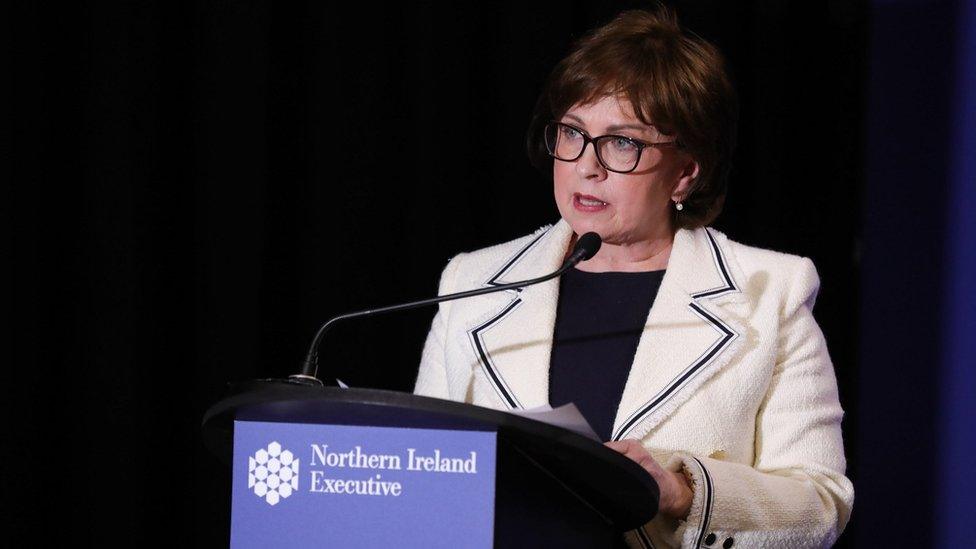
Economy Minister Diane Dodds broadly welcomed Mr Sunak's plan
"In relation to the job support scheme, I have always been clear that to have ended the furlough and the self-employed scheme without putting any UK-wide support in its place would have been disastrous for the NI economy," she said.
"I will, however, need to look very closely at the detail of this new scheme to gauge how it will work for employers and workers, particularly those in sectors still trading at very low levels with many workers still on furlough."

At a glance: Sunak's Job Support Scheme
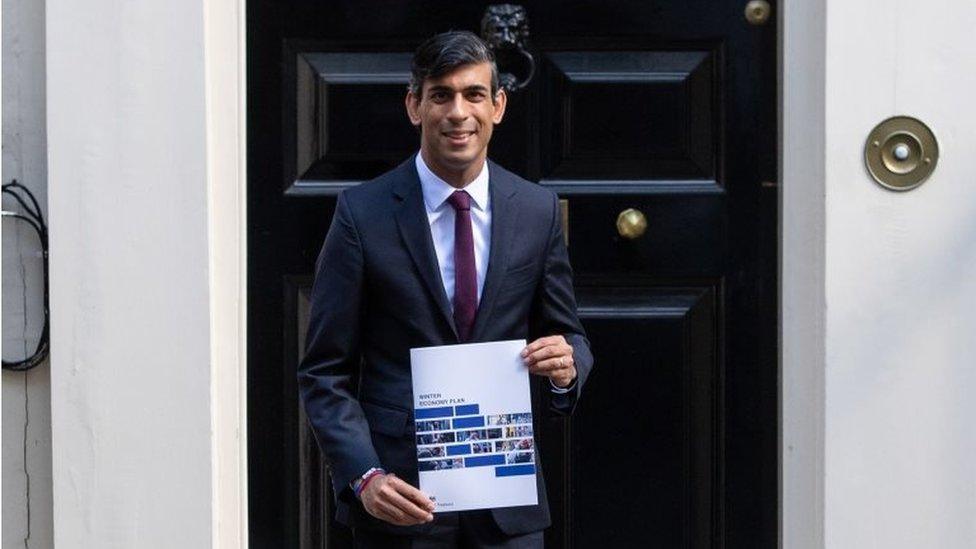
Workers must do at least a third of their normal hours
The government and the employer will pay a third each of the lost hours
It means someone working a third of their hours would receive 77% of their pay
The scheme begins in November and replaces the furlough scheme
It means the government will pay a maximum 22% of someone's wages, down from 80% at the start of the furlough policy

SDLP economy spokesperson Sinéad McLaughlin welcomed the announcement but said her party had "serious doubts about its scope and effectiveness".
"For many employers it will not be enough to enable them to keep all staff in work," she said.
"We can now expect a serious increase in registered unemployment when the furlough scheme runs out next month."
UUP economy spokesman John Stewart said the announcement showed Mr Sunak had "proved that he is not afraid to make bold, creative decisions and step in to attempt to protect as many jobs as possible".
However, at a local level, he criticised what he called a "political game of pass the parcel between Conor Murphy and Diane Dodds, with disputes over which minister is responsible for financial and economic interventions, will undermine confidence."

'A less generous type'

The furlough scheme was a bridge to carry livelihoods through the crisis. But the bridge needs to reach the other side of the gap to be effective.
The chancellor's wage subsidy scheme is a continuation of that support - but it's of a different, less generous type.
As employers will have to pay a more substantial part of wages than before, and employees will have to be working, it's aimed only at those businesses and posts that are viable.
So some workers will slip through the gap: the government is keen that those in unsustainable jobs are spurred to think about their next move.
And that means unemployment will still rise - although not as far perhaps as the four million some economists previously feared. The cost of the chancellor's new plan will run into billions, adding to the shortfall of £320bn the Treasury is already facing.
At some point, taxes may have to rise to help plug that - but there was no mention of that today, for it may be some time before the economy will be strong enough to take that on.
But the bill facing the chancellor now is likely to be far smaller than the ultimate cost to the economy of doing nothing.

Belfast Chamber of Commerce chief executive Simon Hamilton said he was struggling to see how many employers in hard-hit sectors like retail and hospitality, who have reduced trade and face further restrictions, will be able to afford to pay staff for hours they are not working.
"On HMT's own example, a business would have to pay 55% of an employee's wage from reduced revenues for 33% of hours worked," he tweeted, external.
"It seems that the Job Support Scheme may work for some jobs in some sectors but perhaps not those in the industries that need the most help".
The Federation of Small Business (FSB) NI welcomed many of the measures contained in the plan, but said certain areas still needed to be addressed.
"The Northern Ireland Executive should move at pace to bring forward a bespoke re-training scheme for NI, which small businesses can utilise and which enables those losing their jobs to develop new skills," said Roger Pollen.
"We are concerned the chancellor had nothing to say on assistance for those who were left out of the first round of support measures, not least the newly self-employed and company directors."
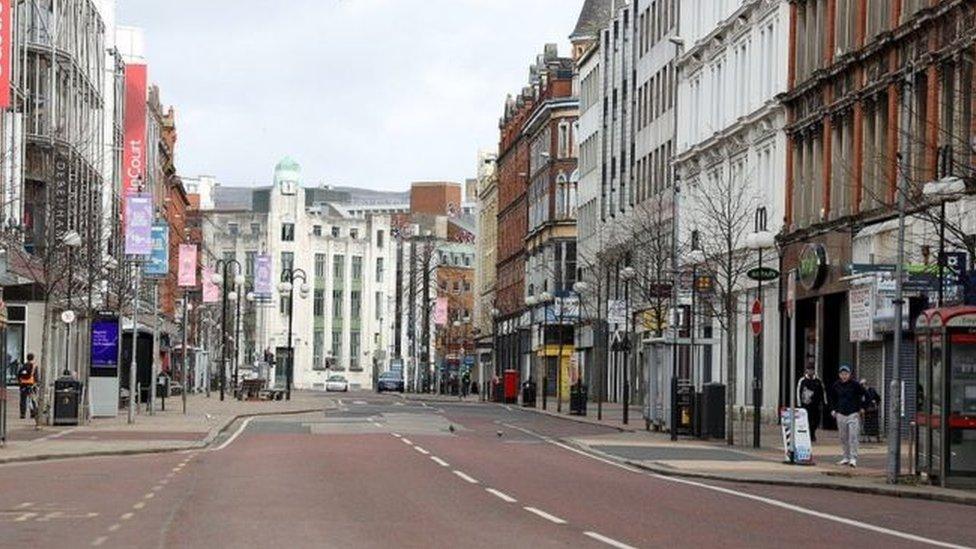
Shop workers union Usdaw said more needed to be done to help the High Street
Shop workers' union Usdaw said the chancellor's announcement did not go far enough and greater help was needed to help the High Street.
"The biggest problem at the moment is Covid and footfall, people are not going into the town centres and the shops, and that's not going to go away anytime soon," said Paddy Lillis.
"These are viable businesses and they need that helping hand over the winter period to keep themselves and keep the employees in.
"If they end up being made redundant the government is going to have to pay the welfare bill anyway.
"Why not put a scheme in now that will take us over this difficult period, keep people in work and save the economy?"
- Published24 September 2020
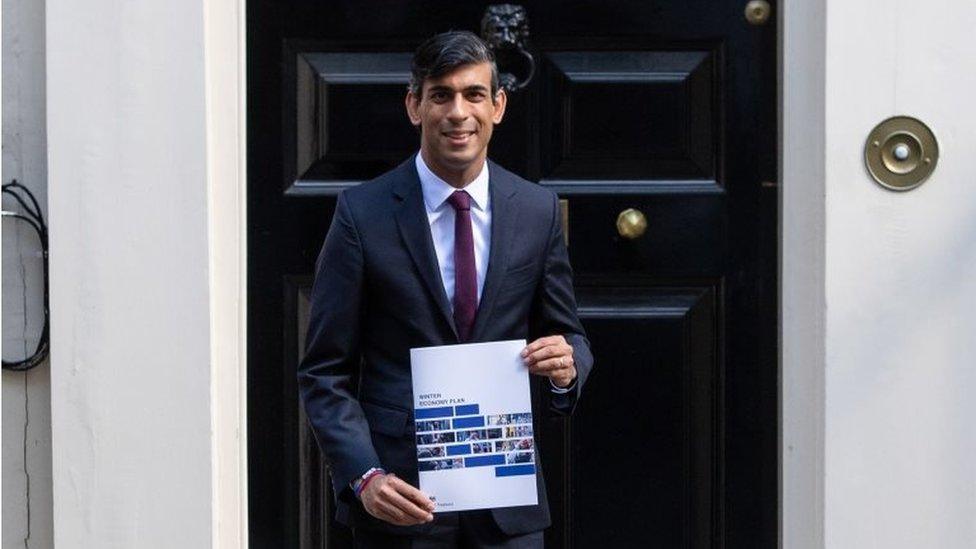
- Published24 September 2020

- Published24 September 2020